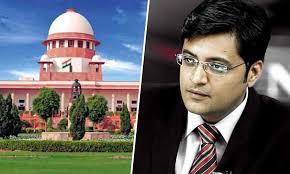The Supreme Court on Friday said liberty across human eras is as tenuous as tenuous can be, as it extended the interim bail of Republic TV editor Arnab Goswami and two others till four weeks after the Bombay High Court decides their pleas for quashing of an FIR in the 2018 abetment to suicide case. The top court noted, “deprivation of liberty even for a single day is one day too many. We must always be mindful of the deeper systemic implications of our decisions.”
A bench comprising Justice D. Y. Chandrachud and Indira Banerjee said: “Liberty survives by the vigilance of her citizens, on the cacophony of the media and in the dusty corridors of courts alive to the rule of (and not by) law. Yet, much too often, liberty is a casualty when one of these components is found wanting.”
The bench noted that the specific case of Goswami is that he has been targeted because his opinions on his television channel are unpalatable to authority. The top court cited that there was a failure of the High Court to discharge its adjudicatory function at two levels – first in declining to evaluate prima facie at the interim stage in a petition for quashing the FIR as to whether an arguable case has been made out. Secondly, in declining interim bail, as a consequence of its failure to render a prima facie opinion on the first.
The top court asked courts across the country to zealously safeguard the liberty of citizens against selective harassment by the state governments, as consequence for those who suffer incarceration are serious. “Common citizens without the means or resources to move the High Courts or this Court languish as undertrials. Courts must be alive to the situation as it prevails on the ground – in the jails and police stations where human dignity has no protector”, the top court observed, as it gave out detailed reasoning of its November 11 order granting interim bail to Goswami and others.
The bench noted that the Bombay High Court, declining relief to him, abdicated its constitutional duty and function as a protector of liberty. “Courts must be alive to the need to safeguard the public interest in ensuring that the due enforcement of criminal law is not obstructed. The fair investigation of crime is an aid to it”, added the bench.
The bench noted that the doors of the apex court cannot be closed to a citizen who is able to establish prima facie that the instrumentality of the state is being weaponised for using the force of criminal law. “Our courts must ensure that they continue to remain the first line of defence against the deprivation of the liberty of citizens”, added the bench.
The top court also cited pendency of cases data from National Judicial Data Grid. In High Courts, 91,568 bail applications are pending and 1.96 Lakh bail applications are pending in district courts.





